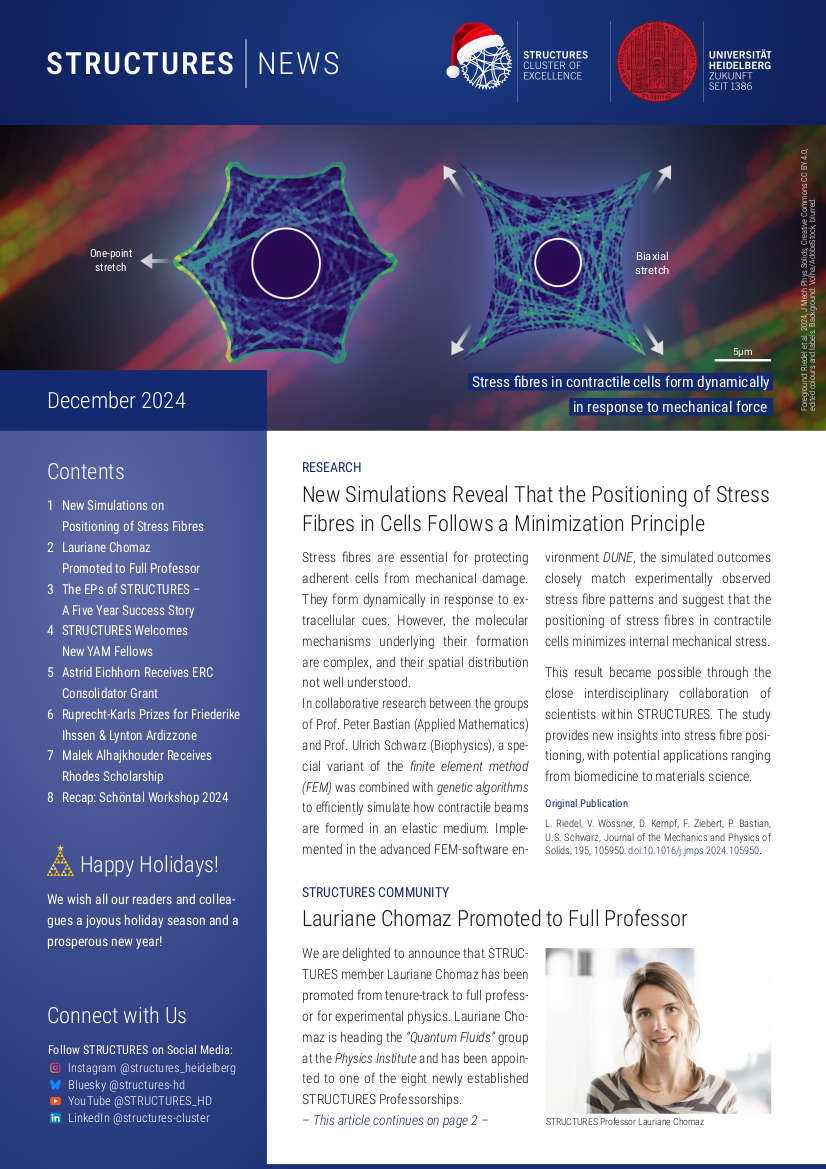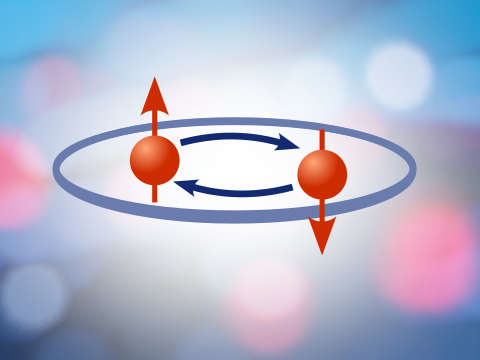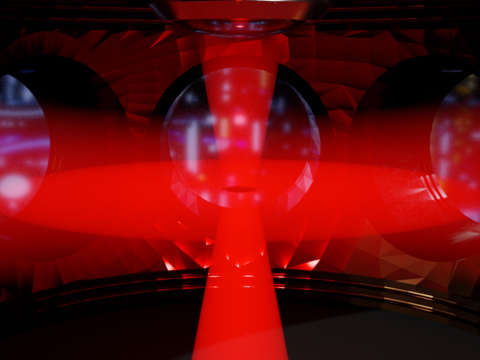Newsroom
Stay informed with our latest news and announcements on this page. For more in-depth content, we also encourage visitors to explore our bimonthly STRUCTURES Newsletter magazine, which features a variety of articles, interviews with members, and background information on our latest research and activities.
Building a Fluid Atom by Atom: Researchers Study Emergent Hydrodynamic Behaviour of a Few-Fermion System
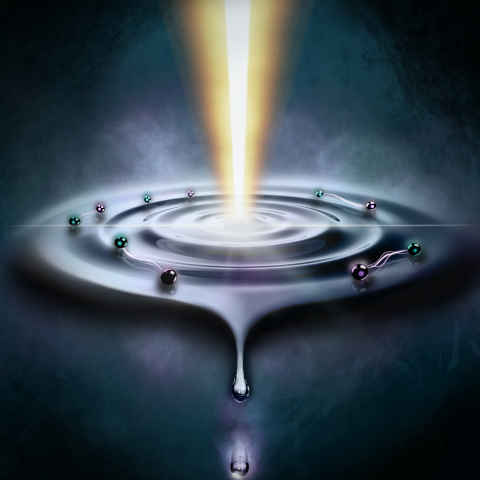
Macroscopic fluid dynamics is usually thought to emerge from vast numbers of microscopic particles. Now, scientists have studied fluid-like behaviour in systems of as few as ten ultracold lithium atoms.
How many particles does it take to form a fluid? A new study led by STRUCTURES researchers, published in Nature Physics, reveals that fluid-like collective behaviour can emerge with as few as ten ultracold lithium atoms. Inspired by observations in high-energy nuclear collisions, where similar phenomena are seen in systems with only a few dozen constituents, the researchers explored the onset of collectivity in quantum systems.
By precisely controlling the number of atoms and the strength of their interactions, they observed elliptic flow – a striking inversion of the initial aspect ratio that is a hallmark of hydrodynamic behaviour. This phenomenon, typically associated with much larger systems, challenges the conventional understanding that elliptic flow requires vast numbers of particles.
The study not only challenges long-held assumptions but also provides access to observables that remain elusive in high-energy nuclear collisions. This interdisciplinary effort, combining advanced experiments and theoretical modelling, paves the way for a deeper understanding of collective phenomena in quantum systems and opens exciting new avenues for research at the interface of quantum physics and particle physics.
Further information:
- Original Publication: Brandstetter, S., Lunt, P., Heintze, C. et al. Emergent interaction-driven elliptic flow of few fermionic atoms. Nat. Phys. (2025).
- News & Views: Fluids constructed atom by atom.
- STRUCTURES Blog post: The Curious Case of the World’s Smallest Fluid.
- Jochim Labs: Ultracold Quantum Gases.
We are happy to present the 18th volume of the STRUCTURES Newsletter, featuring research news, background articles and interviews. The topics of this edition are:
- New Simulations Reveal That the Positioning of Stress
- Fibres in Cells Follows a Minimization Principle
- Lauriane Chomaz Promoted to Full Professor
- The Exploratory Projects of STRUCTURES – A Five Year Success Story
- STRUCTURES Welcomes New YAM Fellows
- Astrid Eichhorn Receives ERC Consolidator Grant
- Ruprecht-Karls Prizes for YRC Members Friederike Ihssen and Lynton Ardizzone
- YRC Member Malek Alhajkhouder Receives Rhodes Scholarship
- Recap: Schöntal Workshop 2024
The STRUCTURES Project Management Office is happy to answer questions.
Scientists at Heidelberg University have achieved a groundbreaking milestone in quantum physics: the creation of a Laughlin fractional quantum Hall state using just two ultracold fermions.
“The whole is greater than the sum of its parts” – this phrase often attributed to Aristotle captures the essence of one of the most intriguing phenomena in nature: emergence. When several parts of a physical system interact, new properties can arise that its single parts do not have on their own. A striking example is the collective behaviour of quantum many-body systems, which can produce novel effects like low-energy excitations carrying a fraction of an electron's charge.
Researchers from the group of STRUCTURES' principal investigator Prof. Selim Jochim at Heidelberg University, in collaboration with Philipp Preiss from LMU Munich, have made significant progress in understanding the emergence of fractional charges. By trapping and spinning a single pair of ultracold lithium-6 atoms in optical tweezers, they replicated the topological properties of this exotic state, previously seen only in bosonic systems. Using a tailored rotation to mimic the influence of a magnetic field, they achieved a strongly correlated atomic state described by physicist Robert Laughlin's wave function for the fractional quantum Hall effect, characterized by its collective and topological nature.
This accomplishment marks a crucial step in the study of emergence of topological phases of matter and paves the way to exploring more complex states, such as quantum Hall ferromagnetism and topological p-wave superconductors.
Further information:
- Publication 1: P. Lunt, P. Hill, J. Reiter, P. M. Preiss, M. Gałka, S. Jochim, Phys. Rev. Lett. 133, 253401 (2024)
- Publication 2: P. Lunt, P. Hill, J. Reiter, P: M. Preiss, M. Gałka, S. Jochim, Phys. Rev. A 110, 063315 (2024)
- APS Physics Viewpoint Article: Ultracold Fermions Enter the Fractional Quantum Hall Arena
- Selim Jochim's group
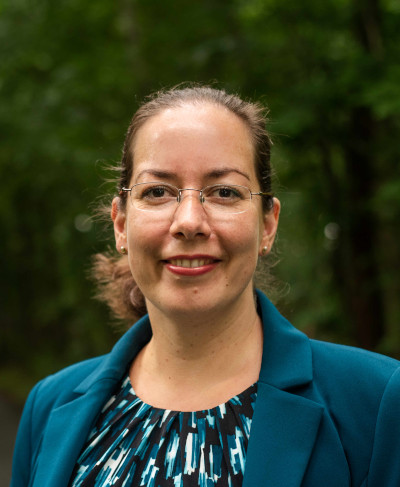
We are delighted to announce that STRUCTURES Professor Astrid Eichhorn has secured one of the prestigious ERC Consolidator Grants by the European Research Council (ERC). This highly competitive grant will support her pioneering research into the quantum nature of gravity, enabling her and her team to deepen our understanding of this fundamental aspect of the universe. Over a period of five years, her project will receive two million euros in funding.
Astrid Eichhorn's research focuses on the quantum properties of space-time and the interplay with the fundamental building blocks of the universe, including elementary particles of the Standard Model of particle physics, dark matter and dark energy. In her ERC-funded project “Probing the Quantum Nature of Gravity at All Scales” (ProbeQG) she aims to primarily explore how to test fundamental theories on the quantum structure of space-time through experiments and observations. The central challenge is that the quantum properties of space-time manifest on tiny length scales – about 17 orders of magnitude below the scales that can be directly examined experimentally by the Large Hadron Collider, the particle accelerator of the European research center CERN. The main idea of the ProbeQG project is to identify “lever arms”. These are systems that translate the effects of quantum gravity on tiny scales into effects that are experimentally accessible. To this end, Prof. Eichhorn and her team want to build a bridge between the theory of asymptotically safe quantum gravity, particle physics, black hole physics and cosmology.
Astrid Eichhorn is a STRUCTURES Professor at the Institute of Theoretical Physics (ITP), where she is heading the Quantum Gravity group. She completed her PhD at the University of Jena, before she pursued a postdoctoral position at Perimeter Institute for Theoretical Physics in Waterloo, and subsequently became a research fellow at Imperial College London. At Heidelberg University she led an Emmy Noether Group on the fundamental quantum structure of space-time and matter from 2016 to 2020. From 2019 she served first as associate professor and from 2023 as full professor at the Centre for Cosmology and Particle Physics Phenomenology at the University of Southern Denmark. In 2024, she returned to Heidelberg, where she was appointed to one of the newly established STRUCTURES Professorships. Prof. Eichhorn's contributions to quantum gravity have earned her recognition as a leading voice in the field.
Further information:
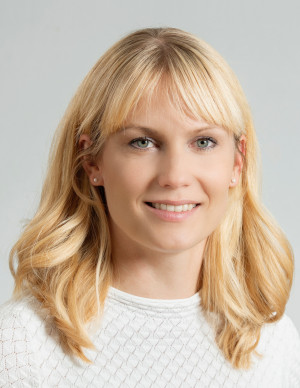
We are delighted to congratulate our member Dominika Wylezalek, research group leader at the Centre for Astronomy (ZAH) of Heidelberg University, on winning one of the three Klaus-Georg and Sigrid Hengstberger Awards for early-career scientists.
Since 2004, the Klaus-Georg and Sigrid Hengstberger Prize has been awarded annually to excellent early-career scientists at Ruperto Carola. The award comes with a prize money of €12,500 and enables the prizewinners to hold a scientific symposium at the International Academic Forum Heidelberg (IWH).
The symposium led by astrophysicist Dominika Wylezalek will focus on the formation and evolution of galaxies – complex phenomena shaped by intricate interactions between stars, gas, dust, black holes, and supernovae. The symposium, titled “Quo Vadis Galaxy Evolution: How Galaxies Form and Evolve,” is scheduled for June 2025.
Weblinks:
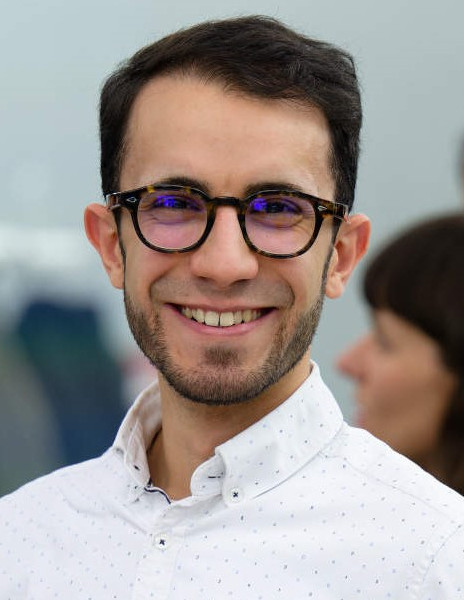
We are delighted to congratulate Malek Alhajkhouder, member of the Young Researchers Convent (YRC) at STRUCTURES, on being awarded the Rhodes Scholarship in recognition of his academic achievements in physics. Malek Alhajkhouder completed his master's degree with a focus on particle physics at Heidelberg University, where he conducted his master's thesis under the supervision of Prof. Jan M. Pawlowski at the Institute for Theoretical Physics.
Originally from Damascus, Syria, Malek Alhajkhouder is a physicist and former scholar of the Heinrich Böll Foundation. His experiences growing up in the Middle East and North Africa (MENA) region and living across multiple countries have profoundly influenced his personality. He further enriched his international academic journey with a semester at La Sapienza University in Rome. At Oxford, Malek plans to pursue a DPhil (PhD) in Theoretical Physics and continue his research, seeking answers to questions regarding elementary particles. In addition, he aims to inspire more students, particularly from the Levant, to engage in fundamental research.
The Rhodes Scholarship is a fully funded, full-time, postgraduate award supporting students from around the world to study at the University of Oxford. It aims at developing public-spirited leaders and fostering international understanding and peace through its diverse, global community of scholars.
Weblinks:
The STRUCTURES Cluster of Excellence is proud to announce that two of its members, Prof Dr Simon Anders and Dr Dylan Nelson, have been recognized as "Highly Cited Researchers" in the latest international evaluation conducted by the analytics company Clarivate. The “Highly Cited Researchers” list includes a total of 20 disciplines from the natural, life and social sciences as well as the cross-field category, recognizing researchers with an outstanding track-record of publications across several disciplines. The latest list of highly cited researchers assessed publications between 2013 and 2023. Highly cited publications are those in the top 1% by citations in their respective field and year of publication.
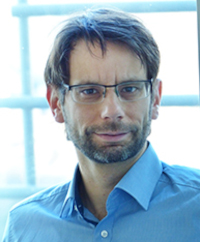
Prof Dr Simon Anders (Biology/Biochemistry):
Prof Dr Simon Anders is heading the Bioinformatics tools for omics data group at BioQuant and ZMBH. Within STRUCTURES, he is part of Comprehensive Project (CP) 3: From Molecules to Cells and Tissue, and involved in the Exploratory Project (EP): Mathematical modelling and model-based data analysis of structured stem cell systems. His research involves developing computational tools for biologists to analyse and interpret high-throughput assay data, particularly in sequencing, visual exploration of large datasets, and integrating transcriptomics and proteomics in functional genomics and systems medicine.
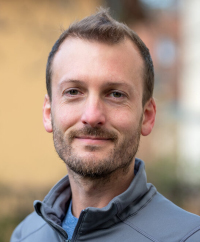
Dr Dylan Nelson (Astrophysics):
Dr Dylan Nelson is heading the "Computational Galaxy Formation and Evolution" Emmy Noether Junior Research Group at the Institute for Theoretical Astrophysics of the Center for Astrophysics (ZAH) at Heidelberg University. Within STRUCTURES, he is involved in Comprehensive Project (CP) 1: Cosmic Structure Formation. Dylan Nelson's research focus is developing and analyzing theoretical (computational) models of galaxy formation and evolution, with an emphasis on cosmic gas. He is also a leader within the IllustrisTNG Project, and Co-PI of TNG50: next-generation large-volume cosmological magnetohydrodynamical simulations of galaxy and large-scale structure formation and of the TNG-Cluster simulation.
